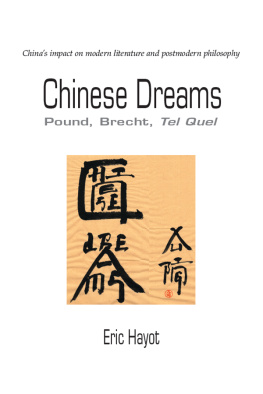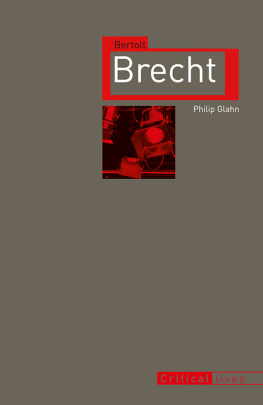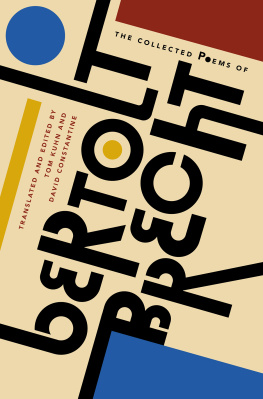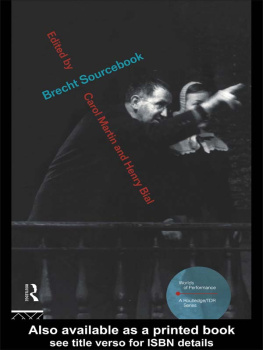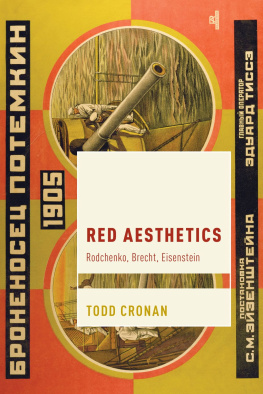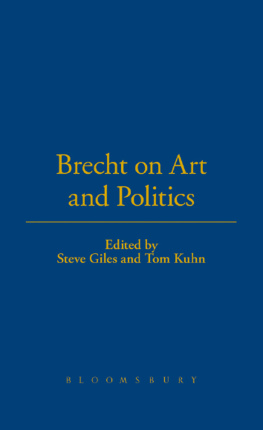Brecht Bertolt - Chinese dreams: Pound, Brecht, Tel quel
Here you can read online Brecht Bertolt - Chinese dreams: Pound, Brecht, Tel quel full text of the book (entire story) in english for free. Download pdf and epub, get meaning, cover and reviews about this ebook. City: Ann Arbor;China, year: 2004, publisher: University of Michigan Press, genre: Detective and thriller. Description of the work, (preface) as well as reviews are available. Best literature library LitArk.com created for fans of good reading and offers a wide selection of genres:
Romance novel
Science fiction
Adventure
Detective
Science
History
Home and family
Prose
Art
Politics
Computer
Non-fiction
Religion
Business
Children
Humor
Choose a favorite category and find really read worthwhile books. Enjoy immersion in the world of imagination, feel the emotions of the characters or learn something new for yourself, make an fascinating discovery.
- Book:Chinese dreams: Pound, Brecht, Tel quel
- Author:
- Publisher:University of Michigan Press
- Genre:
- Year:2004
- City:Ann Arbor;China
- Rating:5 / 5
- Favourites:Add to favourites
- Your mark:
- 100
- 1
- 2
- 3
- 4
- 5
Chinese dreams: Pound, Brecht, Tel quel: summary, description and annotation
We offer to read an annotation, description, summary or preface (depends on what the author of the book "Chinese dreams: Pound, Brecht, Tel quel" wrote himself). If you haven't found the necessary information about the book — write in the comments, we will try to find it.
Chinese dreams: Pound, Brecht, Tel quel — read online for free the complete book (whole text) full work
Below is the text of the book, divided by pages. System saving the place of the last page read, allows you to conveniently read the book "Chinese dreams: Pound, Brecht, Tel quel" online for free, without having to search again every time where you left off. Put a bookmark, and you can go to the page where you finished reading at any time.
Font size:
Interval:
Bookmark:
No figure of twentieth-century literature has had a more public relation to China than Ezra Pound. From the early moments of his career in London to his final days in Italy, Pound made China part of his general project to rethink the nature of the West, to discover in poetry the best that humans had ever said or thought, painted or sung, and renew it. In London Pound first translated Chinese poetry into English, and through that poetry developed an aesthetic theory rooted in a broader, mistaken understanding of Chinese writing. Later, Pound intertwined Chinese characters and philosophy with his Cantos, published translations of Confucian texts, and partially explained his interest by insisting that the texts belonged as much to him as to the Chinese. These ideas stayed with him till the end of his life: a BBC film taken of Pound in the 1960s shows him carefully explaining to the camera the pictorial relation between the Chinese characters for sun  , wood
, wood  , and east
, and east  , an idea that had first surfaced for him in an essay he edited and published in 1918, some forty years earlier (Ezra Pound).
, an idea that had first surfaced for him in an essay he edited and published in 1918, some forty years earlier (Ezra Pound).
The material Pound provides to the scholar of Western images of China offers itself up as a complex, variegated tapestry of errors, misperceptions, half-truths seen and unseen, flashes of pure genius, and great poetry. It has been the subject of a vast literary critical discourse. Following Pound's literary canonization in the 1950s, scrupulous attention has been paid to his readings of Chinese history, the sources of his Confucianism, and especially his translations of Chinese poetry. The books and essays thus produced range from meticulously researched discussions of Pound's original source materialJohn Nolde's Blossoms of the East, for instance, compares every single line of Pound's 1940 Chinese History Cantos with Joseph-Anne-Marie de Moyriac de Mailla's thirteen-volume Histoire Gnrale de la Chineto more theoretical work on the role of the East in the construction of Western modernismof which this book is only one example. Between the practical and the theoretical appear a number of takes on Pound's techniques of translation, ranging from the critical (L. S. Dembo) to the comparatively neutral (Wai-Lim Yip), all struggling to decide how far Pound saw into China, and what, if anything, his vision means for Anglo-American poetry.
How a book takes its place within this network is a delicate subject. Much of the criticism centers on the question of whether Pound got it right or wrong, but I do not decide that question here. Neither am I trying to demonstrate (or refute) the genuineness of China's influence on Western modernism. I will not, along the way, identify and amend ethnocentrisms or errors of translation under the assumption that my own perception is authentic (instead authenticity, and the claims made for and against it, will be one of the subjects of the reading). This is not a reading of Ezra Pound's relationship to China.
It is rather a reading of the still-living subject of Pound and China, a subject that forms itself not only in the texts of Ezra Pound and his contemporaries, but also under the shadow of the critical discourse that has been built around Pound's Cathay, his Cantos, his translations of the Shi jing, his various remarks on Chinese poetry and Chinese writing. On the subject of the possible values of China (and China) in the West, critics have as much to say as Pound himself; my reading aspires to understand and sometimes name the historical shifts in the kinds of questions deemed relevant to the subject of Pound and China. In doing so I am tracing a more general critical history of the relationship between China and Western thought.
Is there still more to say about Pound and China? The flood of books on the subject shows no sign of abating; the questions and ideas at stake in the original debate apparently remain both relevant and provocative. Haun Saussy writes, China has always been, is always still, in the process of being invented; but does one invent it in whatever way one pleases? China names a country, of course, but it more accurately names an international culture; and culture is the identity-tag of a question having, these days in North America at least, a moral as well as an epistemological side (Problem, 4). If the question of knowing China (and I take knowing as a kind of inventing) has moral and epistemological dimensions, then its ongoing relevance ought to be clear, and the ensuing conundrum complicated indeed: What if the very process of knowing itself were premised on some a priori sense of what it would mean to know this country, this international culture, this felt expression of true poesis, this thing called China?
With questions like these, it is not surprising that we are still talking about Pound, and that we might try to read the ways his knowing China has been repeated or refused, elaborated or worked through, by critics interested in cultural questions. It is possible that the history of Pound's invention of China (a history that includes, I am arguing, its own criticism) might set the stage for a discussion of the nature of inventingor knowingitself.
Frame: Orientalism and Modernism
In 1995 Zhaoming Qian published Orientalism and Modernism: The Legacy of China in Pound and Williams, a book that lays out Qian's claim that China's substantial influence on both the principles and principals of Anglo-American modernism has been sorely overlooked. A year later, Robert Kern published Orientalism, Modernism, and the American Poem, an attempt to discover why China catalyzed the poetic experiments of a series of important American poetsPound among them.
This coincidence, the orientalism and modernism repeated, signals the appearance in Pound and China of the obligatory and vital gesture toward Edward Said's landmark 1978 book Orientalism. Orientalism is a damning critique of the West's literary and political production of the Orient, which the book claims helped justify and extend Europe's colonization of the East. It is also one of the major attacks on Western literature's claim to political autonomy. Said insists that the literary academy's separation of literature from politics has concealed the former's cultural and political contribution to imperialism, and goes on to suggest that the West cannot seriously study its own literature unless it considers that literature's relation to its political and social context.
Both Orientalism and Modernism and Orientalism, Modernism, and the American Poem invoke in their titles the specter of a certain reading of modernism, a reading that would argue that the modernists fantastic and ill-informed treatments of China (both books discuss China at length) were intimately related to the West's imperialist designs on that country during the eighteenth and nineteenth centuries. But both books seek to deflect or dismiss such a reading by arguing that the stakes of representation in modernist poetryand particularly in Pound's representations of Chinawere more complicated than allowed for by a simple, politicizing understanding.
Standing in for Pound in the argumentthis in both booksis his friend T. S. Eliot, whose role as the representative of critical modernism depends largely on one sentence, which appeared in his 1928 introduction to Pound's Selected Poems: Pound is the inventor of Chinese poetry for our time. This entrancing declaration has exerted such an influence on Pound scholarship that it is nearly impossible to find work in the field that does not cite it. And yet, as Kern points out, Eliot's remark, often quoted as unqualified praise,actually seems intended to indicate the limits of what Pound had accomplished (3). Eliot had written,
Font size:
Interval:
Bookmark:
Similar books «Chinese dreams: Pound, Brecht, Tel quel»
Look at similar books to Chinese dreams: Pound, Brecht, Tel quel. We have selected literature similar in name and meaning in the hope of providing readers with more options to find new, interesting, not yet read works.
Discussion, reviews of the book Chinese dreams: Pound, Brecht, Tel quel and just readers' own opinions. Leave your comments, write what you think about the work, its meaning or the main characters. Specify what exactly you liked and what you didn't like, and why you think so.

